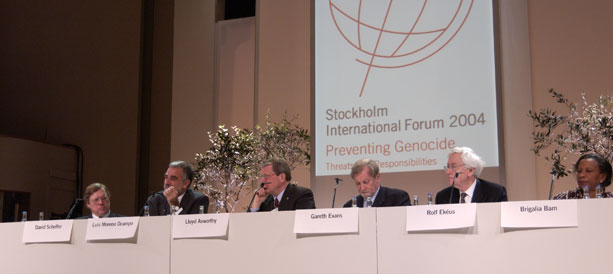
 |
|||||||||
| You are here: Preventing Genocide, Threats and Responsibilities | |||||||||
|
Participants Countries and organizations Conference documentation Conference programme 
|
 Conference Four: Preventing Genocide, Threats and Responsibilities 26 January – 28 January, 2004 This last conference in the series brought together delegations from 55 states, 14 international organisations, as well as a large number of the world’s leading practitioners and experts in the field of genocide prevention. The theme of this conference was one of the most difficult and most delicate issues for the international community: How can we commit ourselves to cooperating and supporting remembrance, research and education that will promote awareness of genocidal dangers among a wider public? The panels and workshops at this Forum examined the issue of preventing genocide from four primary perspectives, four tracks: – Anticipating genocide, mass murder or ethnic cleansing This conference was the first major inter-governmental conference to address these crucial issues relating to genocide prevention since the adoption of the Convention on the Prevention and Punishment of the Crime of Genocide in 1948. It was, therefore, significant that the Secretary General of the United Nations was the opening keynote speaker. He began by expressing his determination to strengthen the UN’s capacity for action, to move the organisation from a culture of reaction to one of prevention. He also proposed the appointment of a Special Rapporteur on the Prevention of Genocide, who would be supported by the High Commissioner for Human Rights but report directly to the Security Council. Also of great symbolic value was the fact that the concluding keynote address was delivered by the Secretary General of the Council of the European Union, Javier Solana, who linked the conference theme to the newly adopted EU Security Strategy agreement. The fourth conference also resulted in a Declaration that included a number of key concepts. One such concept relates to the international community’s common responsibility, the responsibility to protect as described in the “Report of the International Commission on Intervention and State Sovereignty” (ICISS). Another key concept of the Declaration is justice. It raises the importance of perpetrators of genocidal acts being brought to justice. A third key concept is education, the need for education against genocidal dangers and increased awareness of how to recognise early warning signals. |
||||||||
| For information about this production and the Stockholm International Forum Conference Series please go to www.humanrights.gov.se or contact Information Rosenbad, SE-103 33 Stockholm, Sweden | |||||||||